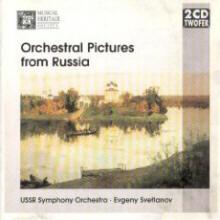|
You are reading the older HTML site Positive Feedback ISSUE 40november/december 2008
Orchestral Pictures from Russia
USSR Symphony Orchestra/Yevgeny Svetlanov BMG Melodiya 74321 34165 2 (2 CDs). TT: 146:11. MUSSORGSKY: Khovantschina: Prelude; Night on Bald Mountain; Sorochintsy Fair: Hopak. BORODIN: In the Steppes of Central Asia; Prince Igor: Polovtsian Dances (with USSR Radio Large Chorus). RIMSKY-KORSAKOV: Sadko, Op. 5; Russian Easter Festival Overture, Op. 36. BALAKIREV: Islamey. ARENSKY: Dream on the Volga: Overture. GLAZUNOV: Spring, Op. 34; Romantic Intermezzo in D, Op. 69. LIADOV: About Olden Times, Op. 21b; From the Apocalypse, Op. 66; Baba Yaga, Op. 56; The Enchanted Lake, Op. 62; Kikimora, Op. 63. KALINNIKOV: Nymphs. One disc of this neat-looking Russian collection turns out to be quite good—the second, which includes the less-familiar works. The paradox of Alexander Glazunov is that his short works—besides those represented here, there's The Seasons, the two Concert Waltzes, and the Poème lyrique—brim with vibrant colors and have a melodic life oddly lacking in his larger-scale works like the symphonies and the ballet Raymonda. Spring is lovely—lush, yet infused with an appropriate freshness. Svetlanov plays it tenderly, and his rhythmic buoyancy keeps the repeated principal motif from wearing out its welcome. The Romantic Intermezzo sounds like an assemblage of diverse bits: a brief, surging introduction; a dignified chorale, building gradually to a climax; a liquid, impulsive Tchaikovskian passage. It's all gorgeous, even if it doesn't hold together, really. The works of Anatol Liadov have been unfairly dismissed as "miniatures." Relatively short in duration they may be, but the composer shrewdly assembles his themes from brief kernels, which he somehow finds time to develop, leaving a satisfying impression of musical substance along with kaleidoscopic color. About Olden Times, imbued with a stately nostalgia, and From the Apocalypse have the strongest "Russian" flavor. Liadov's take on Baba Yaga is less fierce than Mussorgsky's, making her a genial Slavic Sorcerer's Apprentice. The Enchanted Lake is full of a Scriabinesque Impressionism, while Kikimora is more overtly lyrical. (Too bad the Eight Russian Folk Songs from the old Melodiya/Angel LP didn't somehow find their way here as well.) In the music of Anton Arensky, a Tchaikovsky pupil, the older composer's feeling for orchestral sound and musical gesture is put to the service of a considerably lesser melodic inspiration, a possibly disconcerting experience. The Dream on the Volga overture sounds beautiful, but it doesn't linger in the memory. Svetlanov's rather old-fashioned performance, juxtaposing heavy, vibrato-laden brass chorales with a sentimental treatment of the lyrical passages, is pleasant enough while it's happening, at least. Then there's Vasily Kalinnikov, one of my favorite composers nobody knows. (Vinyl collectors should dig up the Melodiya/Angel issues of the two symphonies—the first by Kondrashin, the second by Svetlanov—to find out what the fuss is really about.) The title of Nymphs led me to expect something airy and featherweight—wrong! The strong introductory chords, trumpet and all, put paid to that idea immediately. The scherzando main theme has a Mendelssohnian lightness—it reminded me of the scherzos in Tchaikovsky's early symphonies—but brass instruments keep intruding, enough to give the whole thing a slightly ominous cast. Turning to the first disc, the orchestral transcription of Mily Balakirev's Islamey, which concludes it, goes rather well. At Svetlanov's rather brisk tempo—the timing is just 7.41—the repeated-note triplets, real knucklebreakers for a pianist—become idiomatic string figurations. For a change, this sounds like a "real" orchestral piece with a musical purpose, rather than falling into a sort of limbo between media. The "chestnuts" comprising the rest of that disc, alas, aren't much use: the routine performances won't inspire new listeners, and veterans will already have better. In the Steppes of Central Asia is heavy, sluggish, and stiffly phrased; the Khovantschina Prelude, subtitled "Dawn on the Moskva," doesn't flow. In the Polovtsian Dances—shorn of the opening quick movement played by Ormandy (Sony) and others—Svetlanov holds the "Stranger in Paradise" reprise too rigidly in tempo; the melody lacks the breathing space it had the first time around, and the chorus sounds hard put to keep up. Some of the performances, perhaps because of the digital processing, actually need more color. This Russian Easter Overture, for example, is lively and dashing, but the rival Soviet recording under Dimitri Kitaenko (once available on a Columbia LP) paints it in bolder colors. So does Barenboim's Chicago Symphony account (DG). The recordings, made between 1963 and 1980, are variable in quality. Some of the older items, as indicated, sound a bit "bleached," while others are crudely spotlit. The more recent material—most of the second disc, save for the 1970 Liadov recordings—has a pleasing depth. This set may not be easy to find—BMG appears to have abandoned its Melodiya series after the merger with Sony—but it's worth hunting down for that second disc.
|

